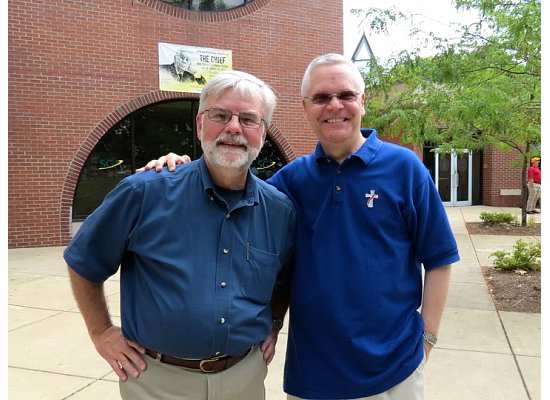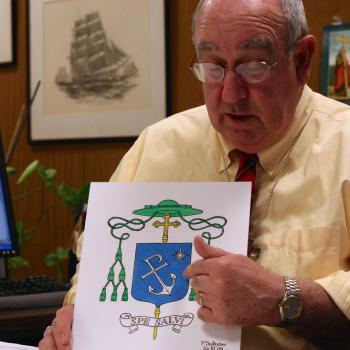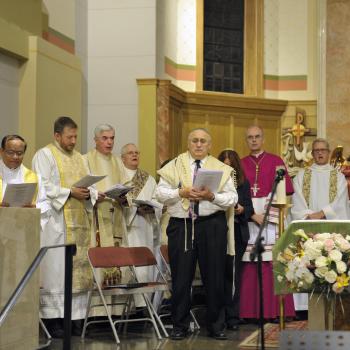My friend Deacon Stephen Byers from the Diocese of Pittsburgh offers some excellent answers in this week’s edition of the diocesan newspaper:
On Saturday, June 15, in a ritual dating back to the time of the apostles, Bishop David Zubik will ordain 25 men at St. Paul Cathedral to the order of deacon for service to the Church of Pittsburgh.
Two of the men, Michael Ackerman and Kenneth Marlovits, are seminarians preparing for the priesthood; becoming a deacon is one of the last major steps on their journey.
The other 23 will be ordained as permanent deacons, a vibrant and growing ministry in the church since the Second Vatican Council. Their ordination will increase the number of permanent deacons in the Diocese of Pittsburgh to 99. Across the nation today, there are more than 26,000 permanent deacons.
At the conclusion of Vatican II in 1965, Pope Paul VI said, “The church has declared herself the servant of humanity.” In the years since then, the idea of the church-as-servant has found concrete expression in the diaconate, so much so that Pope John Paul II said deacons are “configured to Christ in his servant role” and, therefore, are “meant to be living signs of the servanthood of his church.” Ackerman is a member of St. Pio of Pietrelcina Parish in Blawnox/Harmar, Marlovits belongs to St. Rose of Lima Parish in Darlington, and the 23 permanent deacon candidates come from a total of 21 parishes throughout the diocese.
Although permanent deacons have served the Church of Pittsburgh in many facets of ministry since 1974, public awareness of who deacons are, what they do and how they serve is still somewhat limited. With the pending ordination in two weeks, now is a good time to address some fundamental questions about the diaconate.
What is a deacon?
A deacon is a member of an order of ordained ministry with its roots in the earliest days of the church. The New Testament relates that the apostles prayed and laid hands on certain men to designate them for special service to meet the needs of the faith community (Acts 6:1-6).
“Deacon” comes from the Greek word diakonos, meaning “servant.” Strengthened by sacramental grace, in union with the bishop and his priests, deacons are called to serve the people of God in the three-fold ministry of liturgy, word and charity.
Why do we need deacons?
Service has always been at the heart of the church’s ministry. At the Last Supper, in washing the feet of his apostles, Jesus said, “I have given you a model to follow, so that as I have done for you, you should also do” (John 13:15). While all Christians, by virtue of their baptism, are called to serve others, Pope John Paul II said, “The service of the deacon is the church’s service sacramentalized.” Furthermore, he said, the diaconate is not just one ministry among others, but it is truly meant to be a driving force for the entire service of the church.
What are the functions of a deacon?
A deacon has liturgical duties, which he performs primarily in church. In addition, his diaconal service can be expressed in a wide range of non-liturgical ways. For example:
• Liturgically, deacons assist the priest at Mass, where they proclaim the Gospel, preach on occasion and serve as ordinary ministers of the Eucharist. Deacons also may be called upon to celebrate the sacrament of baptism; witness marriages; preside at funerals and burial services; lead the celebration of the Liturgy of the Hours; Eucharistic adoration and Benediction; offer blessings in the name of the church; and administer sacramentals.
• Outside of church, deacons might be found providing pastoral care to people in hospitals, nursing homes and other health care institutions; jails and prisons; food pantries and soup kitchens. They might be called upon to work with immigrants, youths and young adults, those in special need or those on the fringes of society. An important facet of diaconal ministry is to share the faith by evangelizing as well as teaching in RCIA, religious education and sacramental preparation programs. Some deacons also have administrative duties in the church. Basically, anywhere and everywhere people are in need of the Gospel and the love of Jesus Christ is where deacons belong.
And those are just for starters. There’s much more. Check it out. Share it with anyone you know who might be discerning the vocation. It’s a great introduction.
Below, Deacon Byers and Your Humble Blogger from last summer, when I was blessed to give a retreat to the deacons of Pittsburgh at St. Vincent’s in Latrobe. What a great group—and they’re richly blessed to have Steve leading them.












